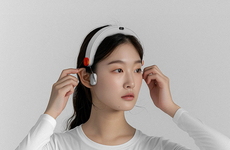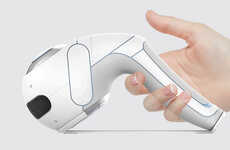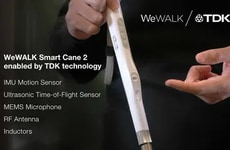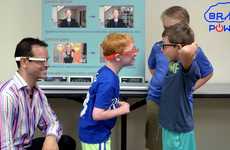
The 'Echo' Helps Individuals with Visual Impairments in Their Daily Lives
Mishal Omar — September 21, 2016 — Tech
References: fastcodesign
This sound navigation device helps individuals learn how to become independent in the face of vision loss or impairment.
Called the 'Echo,' the device was created by Yee Jek Khaw who began to empathize with the difficulties associated with navigating in a world that is not constructed for people with visual impairments. The sound navigation device is connected to an app and users can load familiar sounds onto it so that the Echo can play them. The device is then used in therapy as a way to teach people to learn how to navigate with their visual impairments -- how to differentiate between sounds, determine relative distances in order to "gain directional information" and to pinpoint landmarks so that navigation in noisy areas will still be a possibility.
This device helps to empower people with visual impairments to learn how to navigate on their own, simultaneously ensuring their independence and physical well-being.
Called the 'Echo,' the device was created by Yee Jek Khaw who began to empathize with the difficulties associated with navigating in a world that is not constructed for people with visual impairments. The sound navigation device is connected to an app and users can load familiar sounds onto it so that the Echo can play them. The device is then used in therapy as a way to teach people to learn how to navigate with their visual impairments -- how to differentiate between sounds, determine relative distances in order to "gain directional information" and to pinpoint landmarks so that navigation in noisy areas will still be a possibility.
This device helps to empower people with visual impairments to learn how to navigate on their own, simultaneously ensuring their independence and physical well-being.
Trend Themes
1. Assistive Sound Technology - There is an opportunity to develop sound-based assistive technologies to help individuals with visual impairments navigate their surroundings more effectively and independently.
2. Therapeutic Sound Applications - There is an opportunity to use sound technology for therapeutic applications to help individuals with visual impairments learn how to navigate their surroundings, highlighting the potential of sound-based therapies.
3. Personalized Sound Navigation - There is an opportunity to create personalized sound navigation devices that allow users to upload familiar sounds and landmarks, empowering individuals with visual impairments to navigate their environment on their own terms.
Industry Implications
1. Assistive Technology - The assistive technology industry can benefit from providing advanced sound-based devices that specifically cater to individuals with visual impairments.
2. Therapy and Rehabilitation - The therapy and rehabilitation industry can benefit from incorporating sound-based therapies into their programs to help individuals learn how to navigate the world more effectively and independently.
3. Personal Electronics - The personal electronics industry can benefit from incorporating sound and navigation technologies into their products to cater to individuals with visual impairments and disabilities.
1.5
Score
Popularity
Activity
Freshness























